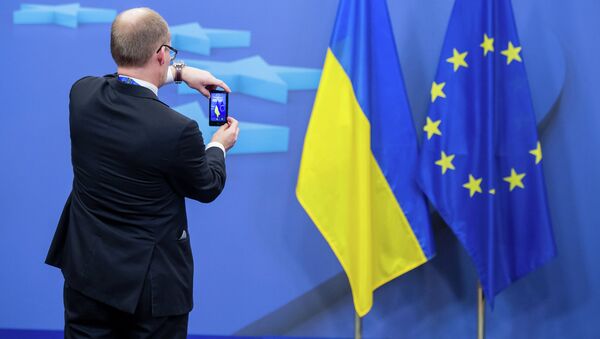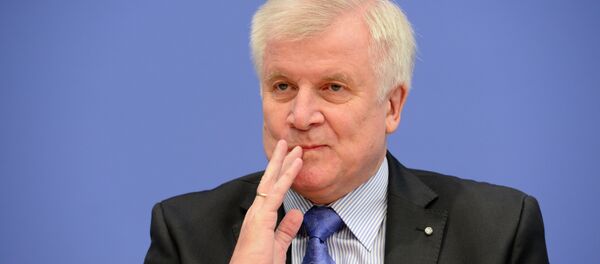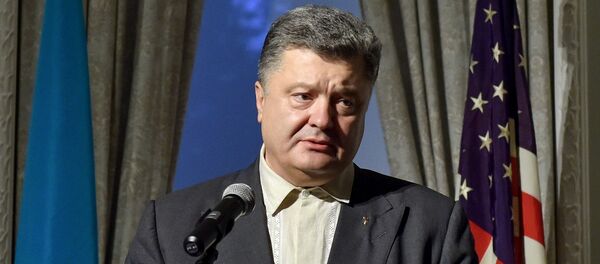Today, virtually all analysts admit that an EU visa-free regime for a country in a state of civil war which is teetering on the brink of total economic collapse is not a realistic possibility in the medium-term.
As a result, Mirzayan, a respected political analyst, explains that "Ukraine today is approached by Brussels according to the 'Turkish option': the EU does not want to accept Turkey into its ranks, and will not accept it in the foreseeable future…but European leaders work so as not to deprive the Turks of hope, so as not to lose their influence in the country. More than that: they seek to use this hope to force Ankara to take steps to liberalize the country's legislation, ostensibly as a step to begin the accession process."
"Now," the analyst notes, "an analogous situation is being observed in Ukraine, where a number of conditions – in the form of the so-called action plan for the liberalization of the visa regime, have been set, factually serving as a package of measures to liberalize the Ukrainian economy."
Unfortunately for the government, Ukrainian lawmakers can't seem to agree on pushing the rest of these 'priority tasks' through.
On Thursday, Mirzayan explained, the Rada "factually refused be led along any further in meeting the EU's demands. The MPs adopted the new Labor Code in its first reading, and in it there was no article, requested by the EU, on the prohibition of employment discrimination. Only 117 of the 226 deputies needed voted to include the corresponding amendment in a second reading."
The government, naturally, was outraged over the lawmakers' behavior. Prime Minister Arseniy Yatsenyuk angrily suggested that "whoever does not vote for the laws which have been prepared by the government, together with European and Western exports, whoever does not support the adoption of these laws, is voting against Ukrainian citizens' right to visa-free travel to the European Union, and for their truly becoming a part of a united greater Europe."
Incidentally, a number of deputies from Yatsenyuk's own People's Front party also voted against the bill.
The Right to Discriminate
Why are the parliamentarians so afraid of Brussels' anti-discrimination amendment? According to Mirzayan, it's at least in part about lustration:
"For the MPs, the amendment carries a number of risks," the analyst explains. "At first glance, the most dangerous part in the amendment is its point on preventing employment discrimination based on a person's political convictions. If they were to agree to this point, the country's program of lustration –an effective tool for the redistribution of assets, the persecution of dissidents and for [artificially] inflating support for the government, will disappear."
Furthermore, according to the expert, MPs are even more embarrassed about the Brussels-proposed point on "non-discrimination on the grounds of sexual orientation."
"Everyone understands that the Rada is living under the Sword of Damocles, teetering on the brink of dissolution," Mirzayan notes. Yulia Tymoshenko's "Fatherland and [Andriy Sadovyi's] Self Reliance parties are already rocking the boat in the governing coalition, trying to force Poroshenko to hold early elections. And considering that the Ukrainian electorate ostensibly aspiring to become part of the EU is very socially conservative, and does not share the European values concerning the rights of sexual minorities, a vote in favor of this amendment might just cost the MPs their future mandates."
As a result, the analyst suggests, "it is not an accident" that with the exception of a few deputies, Fatherland and Self Reliance voted against the amendment, which has already been dubbed the 'LGBT amendment' by the country's media, all the while blaming the government for "the poor quality" of the proposed bill.
Deadlock
Employment discrimination is not the only bump on the road in the path toward a visa-free agreement. Brussels, according to Mirzayan, "is also trying to force lawmakers to adopt a whole package of anti-corruption legislation which would affect the financial interests of Ukraine's oligarchs, and hence the deputies themselves."
As a result of these disagreements, Ukraine's lawmakers have now postponed consideration of these and other Brussels-proposed amendments until November 10, despite "knowing full well that the day earlier, on November 9, the foreign ministry must send Brussels a statement on whether they accept or reject the package of laws necessary for visa liberalization. In turn, by mid-December, the EU is set to provide a public assessment of Kiev's actions in this matter."
Mirzayan notes that if the situation continues to unfold as it has up to the present, "Brussels will have the perfect excuse to officially postpone liberalization indefinitely…And Ukraine's lawmakers, the government and even the president will use such a decision to accuse each other of disrupting the introduction of a visa-free regime. In the end, everyone will benefit –even the Ukrainian people who, disillusioned with the myth of visa-free travel to the EU, may come to their senses and fully realize just how futile the promises of Maidan really are."






